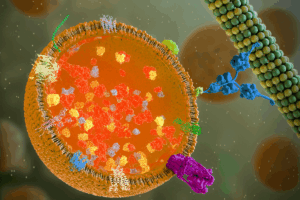
Understanding the impact of environmental exposure on early brain development is essential, as many neurological and psychiatric disorders may originate during the prenatal or early postnatal period. With global air pollution levels rising, scientists are increasingly examining how such exposures affect the neurodevelopment of a fetus. The prenatal period is particularly sensitive, and the environmental factors can alter brain structure, function, and long-term health outcomes. Early biomarkers, such as changes in neonatal myelination, may help guide preventive measures to minimize developmental damage.
Myelination, the process by which nerve fibers are coated with protective myelin, begins during the prenatal stage and continues into early adulthood. It improves the speed and efficiency of neural communication, and it is closely connected with the cognitive and behavioral milestones. Because myelination reflects brain maturation, it serves as a reliable indicator of early neurodevelopment. Earlier research has demonstrated that exposure to air pollution during pregnancy may modify myelin content and white-matter integrity later in childhood. Nonetheless, limited evidence exists on how these effects manifest at the neonatal stage.
PM2.5, which is used to refer to particle matter ≤2.5 micrometers in diameter, is a common indicator of air pollution. It consists of different materials from multiple sources and can penetrate biological tissues, such as the fetal brain. Metals commonly found in PM2.5, such as iron, copper, and zinc, are essential for healthy myelination but may be neurotoxic in excessive amounts. These particles can cross the maternal-fetal barrier, and they are able to affect brain development, which may also be modified by maternal nutrition.
The study was conducted as part of the AirNB Project under the European Research Council Grant Agreement 785994. It examined the relationship between prenatal exposure to PM2.5 and the alterations in the neonatal white-matter myelination. The research was incorporated into the Barcelona Life Study Cohort and included 1,080 mother-child pairs recruited between October 2018 and March 2021. Among these, 132 neonates underwent magnetic resonance imaging (MRI), and 93 scans of adequate quality were analyzed. The mean postmenstrual age was 44.0±1.2 weeks, and the mean postnatal age was 29.0±4.3 days.
Exposure estimates for PM2.5 and its metal components were generated using Land Use Regression (LUR) models, which achieved R2 values of 47%, 91%, 90% and 89% for PM 2.5, PM 2.5-iron, PM 2.5 copper, and PM 2.5 zinc, respectively. Comparisons were made between exposures in the first and the third trimester to distinguish early versus late gestational effects. Neonatal MRI was performed using a 3.0 Tesla Philips scanner during natural sleep, and myelination was evaluated through T1 and T2-weighted imaging.
These findings showed that there were significant correlations between prenatal PM2.5 exposure and decreased myelination levels. Early (first trimester) exposure was associated with lower cortical myelination (β = –0.003, r = –0.31, p = 0.004). Increased exposure during late pregnancy was also correlated with reduced global myelination with β = -0.455, r = -0.29, and p = 0.005. No association was observed between PM2.5 exposure and total brain volume.
Individual trace metals exhibited a similarly negative but non-significant relationship with myelination when total PM2.5 exposure was added in the model, indicating that the overall PM2.5 burden, rather than its metallic components, drives the observed effects. Postmenstrual age showed a positive correlation with global myelination with β = 1.37, r = 0.33, p = 0.001, which confirms that the imaging measures accurately reflected developmental progression.
The researchers concluded that prenatal exposure to fine particulate matter (PM2.5) was associated with reduced neonatal white-matter myelination, which indicates potential delays in early brain development. Although slower myelination may not necessarily imply permanent impairment, these findings highlight that maternal exposure to air pollution could affect the early stages of neurodevelopment and underscore the need for preventive public-health interventions.
Reference: Pujol J, Martínez-Vilavella G, Gómez-Herrera L, et al. Unraveling the impact of prenatal air pollution on neonatal brain maturation. Environ Int. 2025;204:109801. doi:10.1016/j.envint.2025.109801












